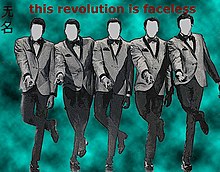Wu Ming
Wu Ming (= in Mandarin Chinese, depending on the emphasis “without a name” or “five names”) is the name of an Italian writers' collective originally (2001 - spring 2008) consisting of five members , which emerged in 2000 from the Luther Blissett Project . From a political point of view, the collective of authors assigns itself to the new social movements . The group lives and works in Bologna .
The members of the author collective refuse to be photographed or filmed and do not show any pictures of themselves on their website, but have led and still carry out extensive reading tours in Italy, so that their members are well known:
- Roberto Bui (Wu Ming 1)
- Giovanni Cattabriga (Wu Ming 2)
- Luca Di Meo (Wu Ming 3 - until spring 2008)
- Federico Guglielmi (Wu Ming 4)
- Riccardo Pedrini (Wu Ming 5)
Wu Ming 3, Luca Di Meo, left the group in spring 2008 for personal reasons after the newsletters of the Giap group reported on September 16, 2008.
Viewpoints and way of working
In their collective way of working, they also address and negate the author's idea. They insist that it doesn't really exist and that writing - like any other form of human activity - is always something collective . If so, it is a logical consequence that no one can claim copyright , i.e. the claim to intellectual property, for themselves.
In terms of content, alternative models of history play a role that contrast with the official historiography. It is not the lords and emperors who are the bearers of history, but each individual, the multitude in the sense of Spinoza and later Antonio Negris / Michael Hardt in Empire .
Works
The group's novels , especially Asce di Guerra (hatchet), 54 (published in German in 2015) and Q (the only work translated into German for a long time , published by Piper in 2002 ), are all distributed without copyright and are on can be downloaded free of charge from the homepage.
54
"54" takes place in 1954 at different locations, but for the most part in the milieu of former fighters of the Resistance in Italy and in the smugglers' milieu . The story takes place in many different places and only occasionally do these narrative threads cross. Cary Grant , who is hired by the British to play Tito in a film , also plays an important role .
The novel 54 begins with the words There is no post-war period . When asked about this by Radek Krolczyk, Wu Ming 2 declared: At the end of the Second World War, post-colonial conflicts explode. The war doesn't end, it just changes territory. And Wu Ming 5 added: Where peace begins, war continues along a vertical line: against the subaltern, against workers and against the poor. Maybe weapons aren't even needed anymore. But the war remains. There is only one shift.
List of works
Novels
Published in Italy:
-
Q , still as Luther Blissett, Turin, Einaudi , 1999, ISBN 88-06-14740-4
- German: Q , Hamburg, Association A, 2016, ISBN 978-3-86241-450-5
-
Asce di guerra , with Vitaliano Ravagli, Milan, Tropea, 2000, ISBN 88-438-0269-0
- German: Kriegsbeile , Hamburg, Association A, 2017, ISBN 978-3-86241-459-8
-
54 , Turin, Einaudi, 2002, ISBN 88-06-16203-9
- German: 54 , Berlin, Association A, 2015, ISBN 978-3-86241-441-3
-
Manituana , Turin, Einaudi, 2007, ISBN 978-88-06-18584-8
- German: Manituana , from the Italian by Klaus-Peter Arnold, Berlin, Association A, 2018, ISBN 978-3-86241-465-9 .
-
Altai , Turin, Einaudi, 2009, ISBN 978-88-06-19896-1 (follow-up to Q)
- German: Altai , from the Italian by Klaus-Peter Arnold, Berlin, Association A, 2016, ISBN 978-3-86241-452-9 .
-
L'armata dei sonnambuli , Turin, Einaudi Stile Libero Big, 2014, ISBN 978-88-06-21413-5
- German: The Army of the Sleepwalkers , from the Italian by Klaus-Peter Arnold, Berlin, Association A, 2020, ISBN 978-3-86241-474-1 .
Short stories
- Previsioni del tempo , Milan, Edizioni Ambiente, 2008, ISBN 978-88-89014-51-6 ; Turin, Einaudi, 2010. ISBN 978-88-06-20267-5
- Grand River. [Un viaggio] , Milan, Rizzoli, 2008, ISBN 978-88-17-02043-5
Audio books
- Pontiac. Storia di una rivolta , with Wu Ming 2, Giuseppe Camucoli and Stefano Landini, with CD, Reggio Emilia, Vincent Books, 2010, ISBN 978-88-904980-0-8 (text and voice by Wu Ming 2, music by Egle Sommacal , Paul Pieretto, Stefano Pilia, Federico Oppi. Illustrations by Giuseppe Camuncoli and Stefano Landini)
- Basta uno sparo. Storia di un partigiano italo-somalo nella resistenza italiana , with Wu Ming 2, with CD, Massa, Transeuropa, 2010. ISBN 978-88-7580-099-4 (text and voice by Wu Ming 2, music by Egle Sommacal, Paul Pieretto, Stefano Pilia, Federico Oppi)
Discography
- Yo Yo Mundi, 54, Materiali Musicali / CD del Manifesto , 2004 (texts from Roman 54, recited by Marco Baliani, Giuseppe Cederna, Fabrizio Pagella and Francesco Di Bella from 24 Grana .)
- Skinshout (Francesco Cusa, Gaia Mattiuzzi, Xabier Iriondo), Altai, Improvvisatore Involontario , 2010, (A kind of soundtrack to the novel Altai )
- Wu Ming Contingent , Bioscop, Woodworm Label, 2014
literature
- Christina Schaefer, "Wu Ming, New Italian Epic and the Draft of a New Italy", in: Una gente di lingua, di memorie e di cor. Italian Literature and Difficult National Unity from Machiavelli to Wu Ming , ed. v. Marc Föcking and Michael Schwarze, Winter, Heidelberg 2015, pp. 187–204.
Web links
- http://www.wumingfoundation.com Group texts for download
- https://www.freitag.de/autoren/der-freitag/wu-ming-ist-viele Radek Krolczyk in the Friday about Wuming
Individual evidence
- ↑ Interview by Radek Krolczyk with Wu Ming 2 and Wu Ming 5: There is no post-war period in concrete 6/2015, p 53/54
- ↑ "Un dispaccio col cuore in mano e l'anima oltre le fiamme" , Giap no. 1, ninth series, September 2008.
- ↑ Interview by Radek Krolczyk with Wu Ming 2 and Wu Ming 5: There is no post-war period in concrete 6/2015, page 53
